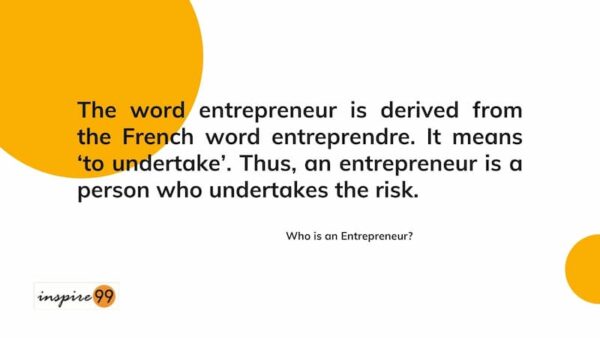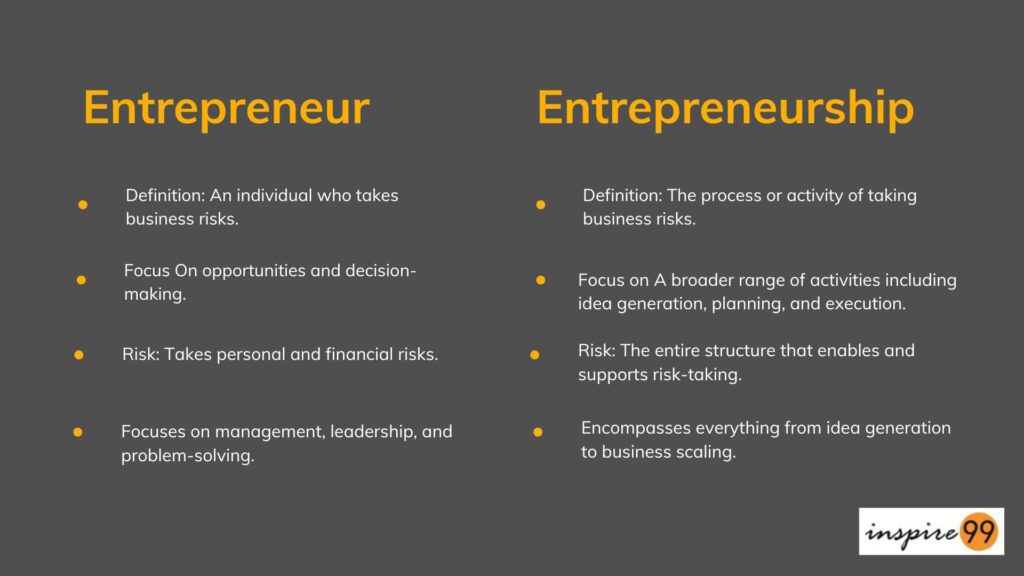The word Entrepreneur is derived from: This article is about the origin of entrepreneurship, derivation and its meaning. As we know, entrepreneurship and risk are closely related. The word entrepreneur is derived from the ability to take risks. In a business context, this risk is about investing time, resources and opportunity cost in creating value for the end user.
Table of Contents
The Word Entrepreneur is derived from Entreprende
The word entrepreneur is derived from the French word entreprendre. It means ‘to undertake’. Thus, an entrepreneur is a person who undertakes the risk. This risk refers to starting an enterprise or creating a business. In this example, an entrepreneur can be defined as a founder. Ultimately the origins of the word entreprende surround taking risks, creating business and generating value.

Origin and change in the meaning of the word Entrepreneur
From the 17th century, the meaning of the word entrepreneur has taken many changes. It is also reflective of the types of businesses that existed during that time. What used to be referred to for theatrical productions or managing has now changed to any small business. In essence, it has come back to the meaning of taking a risk, no matter what the domain is.
- During 17th century entrepreneur was used to refer to a manager or promoter of theatrical productions
- In 18th century, entrepreneur was an individual who took business risks for profit.
- 19th Century expressed entrepreneur as organisers and leaders of business
- 20th century onwards it is used to showcase innovation, creating something new in the market
As you can see, the origins of the word entrepreneur has changed over centuries to take on different meanings. But the basics of this definition remain the same – to undertake risks, create new business and bring something new in the market.
Who is an entrepreneur and what is entrepreneurship?
As we discussed in the article – what is a startup and its difference with small business, an entrepreneur can be a founder of either. The difference between the two is in their purpose. We build a startup for scale, expansion and growth. The pressure to grow, scale and return an exponential return is huge. As a small business you can afford to focus on value, staying small and providing great quality of service. You can do this in a startup too, but can’t afford to stay small or grow at an organic pace.
We can better elicit the differences between entrepreneur and entrepreneurship from the image below. The entrepreneur refers to an individual taking up an entrepreneurial venture or entrepreneurship. It has however become more accepted nowadays with more opportunities and the ease of creating new businesses. If you have an idea, that’s a great starting point and you are well ahead of becoming an entrepreneur. All you need to do is to work on a business plan to identify the revenue sources, growth plan and you’re in the process of becoming a small business if not a startup.

Meaning of an Entrepreneur
An entrepreneur is someone starting a business or a venture. The type of business can belong to any of the four types of entrepreneurs. Depending on the impact and area you want to operate, you can create the corresponding type of business. As long as you register a business and are actively trading – you can be qualified as an entrepreneur.
You can register a business as either – Sole Trader, Partnership or a limited company based on how you want to operate. The purpose of your business defines the type of entrepreneur you can become.
Meaning of Entrepreneurship
Entrepreneurship, as a profession, involves the work of an entrepreneur. In fact, there is not much distinction between business and entrepreneurship. Rather, a business can be seen as an evolved stage of the early entrepreneurial journey. It is interesting to note that entrepreneurship can take various forms. The most common types of startups are: small business entrepreneurship, scalable startup entrepreneurship, large company entrepreneurship, or even social entrepreneurship.
As a founder, I’d focus on the types of entrepreneurship to indicate the future strategy. If your cause is social, then it must become a part of your vision and culture. The same applies to your commercial growth strategy or innovation as well. It comes back to the purpose of your business idea and how you want to shape its feature. Entrepreneurship is a beautiful opportunity to change and create innovation. It must always focus on value addition and keep the customer in mind.
References:
https://www.investopedia.com/ask/answers/08/origin-of-entrepreneur.asp
Entrepreneurship: https://en.wikipedia.org/wiki/Entrepreneurship

Pingback: 10 Definitions of entrepreneurship to inspire us into action - Inspire99
Pingback: 5 Types of Risk in Entrepreneurship - Inspire99
Pingback: Difference between Entrepreneur and Entrepreneurship for a founder - Inspire99
Pingback: 9 Differences Between Manager and Entrepreneur - Inspire99
Pingback: 5 Key points on - Are Entrepreneurs born or made? - Inspire99
Pingback: 3 Key Characteristics of Fabian Entrepreneurs - Inspire99
Pingback: If a new entrepreneur was to come to you for advice - Inspire99
Pingback: Scalable Startup Entrepreneurship definition - Inspire99
Pingback: How to Become a Startup Entrepreneur? - Inspire99
Pingback: 3 Main Differences Entrepreneur vs Manager - Inspire99
Pingback: How to use Porter’s 5 forces in a startup - Inspire99
Pingback: How to think of a good idea for a startup? - Inspire99
Pingback: What is a Small business entrepreneurship? - Inspire99
Pingback: Top 25 Entrepreneur Quotes for a business founder - Inspire99
Pingback: Exploring The Meaning And Role Of Entrepreneurship In France
Pingback: Why do you need a mentor for startup? - Inspire99
Pingback: Does Outsourcing for startups work? - Inspire99
Pingback: Four Types of Entrepreneurship for a Founder - Inspire99
Pingback: 5 Key Areas of difference between entrepreneur and businessman - Inspire99
Pingback: Why do you need to have an entrepreneurial mindset? - Inspire99
Pingback: Define the term Entrepreneur, Types of risks undertaken - Inspire 99